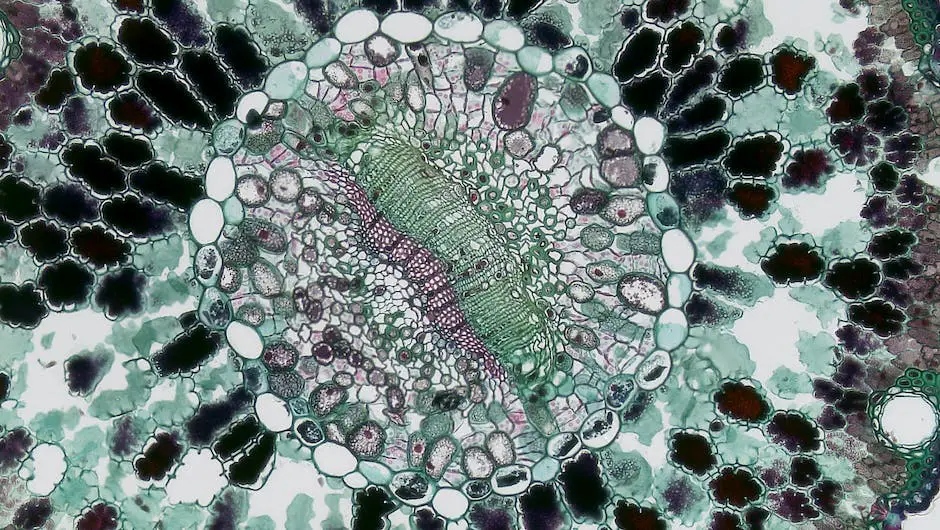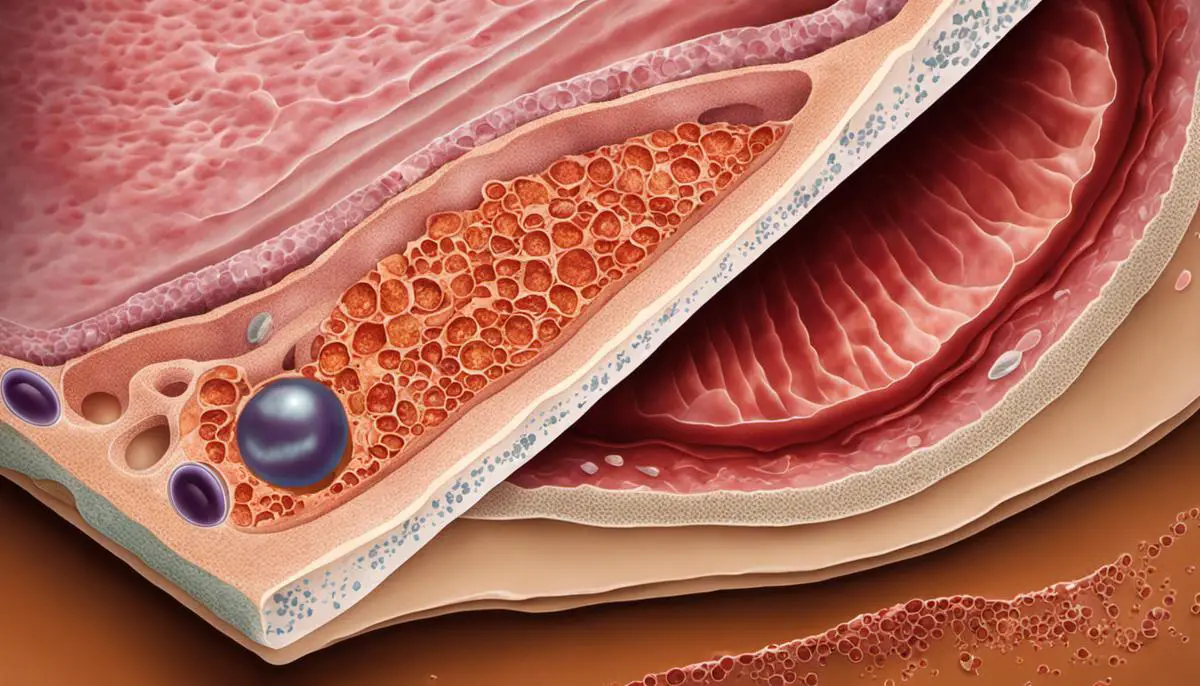Basal cell skin cancer, one of the most common types of skin cancer, is a disease that often goes undernoticed in its early stages. This cancer, associated with prolonged and excessive exposure to the sun, develops in the basal cells – the skin’s building blocks that line the deepest part of the skin’s outer layer. Understanding this disease, beyond its medical and scientific terminology, is crucial for the general public, especially considering its incidence is on the rise. With this knowledge, we can discern the warning signs, comprehend the risks, and acknowledge the consequences if left untreated. The goal of this text is to provide a comprehensive understanding of basal cell skin cancer, its progression if untreated, its health effects and psychological implications, and finally, emphasize the role of prevention and early intervention in managing this disease.
Understanding Basal Cell Skin Cancer
Understanding Basal Cell Skin Cancer:
Basal cell skin cancer is the most common form of skin cancer. This type of cancer arises from the basal cells, which are found in the bottom layer of the skin’s epidermis and are responsible for producing new skin cells when old ones die off. Basal cell cancers typically develop as a result of prolonged exposure to ultraviolet (UV) radiation, either from the sun or tanning beds. Fair skin, family history, older age, gender (men are more susceptible), and exposure to radiation or certain chemicals are also risk factors.
Course and Prognosis of Untreated Basal Cell Skin Cancer
If left untreated, basal cell skin cancers can lead to significant cosmetic disfigurement and functional impairment, particularly since these cancers often occur on the face. Over time, they can invade and erode surrounding skin tissue and structures, causing damage that might affect nerves or result in the loss of an eye or ear.
Contrary to common misconception, these tumors can spread (or metastasize) to other parts of the body, although this is exceedingly rare. Even so, progressive growth can result in complications such as pain, bleeding, or infection.
Understanding The Outcome of Untreated Basal Cell Skin Cancer
The progression and eventual outcome of untreated basal cell skin cancer is influenced by factors such as the size and location of the tumor, the duration the cancer has been progressing untreated, and the overall health of the affected individual. Elements such as age, the condition of the immune system, and the presence of other underlying health conditions also play significant roles in dictating the course and severity of this disease.
It can’t be emphasized enough that early detection and quick treatment of basal cell skin cancer significantly increases the chances of maintaining skin health and minimizing potential complications including disfigurement. Fortunately, most basal cell carcinomas exhibit slow growth. Therefore, by regularly monitoring their skin and seeking immediate medical help when changes are noted, individuals can look forward to a highly positive prognosis.

Progression of Untreated Basal Cell Skin Cancer
An Overview of Basal Cell Carcinoma: The Most Predominant Skin Cancer
Basal cell carcinoma (BCC) leads the pack as the most commonly diagnosed form of skin cancer, accounting for approximately 80% of all cases. BCC starts in the basal cells, found in the lower layer of the skin, otherwise known as the epidermis. While BCC commonly appears on sun-exposed areas of the body such as the face, neck, and arms, it’s important to note that it can just as easily develop on any part of the body, regardless of sun exposure.
How Basal Cell Carcinoma Progresses
BCC often initiates as a small, shiny bump or nodule on the skin which can be pink, brown, or skin-colored. Its growth tends to be slow and occurs over months to years, often misrecognized as harmless pimples or scars. It is predominantly localized and rarely spreads or metastasizes to other body parts. Its spread to the surrounding tissues, however, can be extensive if unchecked.
Potential Dangers of Untreated Basal Cell Carcinoma
Leaving BCC untreated allows it to grow and penetrate deeper into the skin and the nearby tissues. Its tentacles can branch out, disrupting and disfiguring underlying muscles, nerves, and bones. Although this type of cancer rarely spreads to distant parts of the body (a process called metastasis), it can spread to nearby areas, sometimes reaching vital organs.
Negative health impacts of untreated BCC don’t stop at physical disfigurement. Unchecked BCC particularly on eyelids or lips can lead to loss of these body parts and functions. If it extends into the ear, it may cause hearing loss. When BCC invades the eye or the region surrounding it, it could result in visual complications, including the loss of an eye. It’s critical to note that although rare, BCC can become life-threatening if it spreads to the brain or other vital organs.
The Emotional and Psychological Aspect
Apart from physical consequences, untreated BCC can also induce emotional and psychological distress. Living with visible skin changes and physical disfigurements can significantly impact a person’s self-esteem and social interactions. This can lead to feelings of self-consciousness, social anxiety, depression, and in severe cases, isolation.
An Overview
Considering Basal Cell Carcinoma (BCC) tends to grow slowly and is seldom life-threatening, one may easily overlook its potential gravity. Nonetheless, allowing this type of skin cancer to progress without treatment can result in significant health issues and a decline in the quality of life. Early diagnosis followed by appropriate treatment is the most efficient approach to BCC management. Regular skin examinations, particularly for those who’ve had greater exposure to the sun, are vital in preventing BCC and its consequential complications.

Health Effects and Complications
Untreated Basal Cell Carcinoma: Negative Impact and Health Risks
As the most prevalent type of skin cancer, untreated Basal Cell Carcinoma (BCC) can open you up to a host of health problems. These issues primarily affect the skin and nearby structures. Although BCC usually develops slowly, making initial symptoms easy to dismiss, delaying treatment can trigger severe consequences.
The most evident effects of untreated BCC manifest on the skin. Typically starting as small, shiny bumps or patches, these tumors may bleed after minor injury. If they continue to grow, BCCs can induce a plethora of skin issues including large sores, skin disfiguration, severe itching, pain, and inflammation. In such cases, the skin’s protective role might be weakened, exposing the body to a higher risk of infections.
Moreover, if not treated, BCCs can invade surrounding areas, leading to the damage of nearby muscles, bones, and nerves. If BCC develops near vital structures such as the eyes, ears, or mouth, it may significantly impair their function.
While BCC is rarely a metastatic cancer, indicating it’s unlikely to spread to distant organs, there are exceptions. In incredibly rare situations, it can spread to the lungs, bones, or lymph nodes. Treating these metastasized cancers can be exceptionally challenging and may lead to serious complications.
Beyond the physical, untreated BCCs can have significant impacts on mental health. Physical disfigurement can result in psychological distress including anxiety and depression. Moreover, if BCC hinders functions like sight, it could further escalate psychological and emotional issues.
In some instances, not treating BCC can be deadly. Although such cases are uncommon and are typically connected to aggressive forms of the disease, the potential seriousness should not be understated.
Thus, the risk of BCC should never be underestimated. Early detection is paramount, along with immediate treatment to prevent the previously mentioned health complications. Preventive strategies such as routine skin checks and sun protection are also crucial in combatting the risk of BCC.

Psychosocial Impacts of Untreated Skin Cancer
Psychological Impact of Living With Untreated Basal Cell Skin Cancer
Apart from the physical concerns, untreated basal cell skin cancer also significantly impacts a patient’s psyche. The knowledge that an individual is living with an untreated, potentially escalating condition leads to persistent anxiety and trepidation. Added to this is the distress over the cosmetic changes the disease can cause, such as obvious scarring and skin lesions, which may trigger depression and low self-esteem.
The persistent uncertainty surrounding the progression of untreated basal cell skin cancer often leads to chronic stress in patients. Not knowing how their condition might progress or impact daily activities contributes to anxiety, leading to an overall decline in mental well-being.
Threat to Personal Relationships
Interpersonal relationships can also be affected by untreated skin cancer. This effect extends from personal relationships like family and friends to professional interactions. The physical changes caused by basal cell skin cancer can lead to self-isolation due to perceived stigma, embarrassment, or fear of judgment about their appearance. This retreat from social interactions can strain existing relationships and make it hard for the patient to form new ones.
Moreover, the emotional toll of stress and anxiety related to their condition can make it difficult to maintain healthy interactions. Patients may find it challenging to communicate their feelings or concerns about their condition, causing misunderstandings or tension in their relationships.
Impact on Daily Life and Self-esteem
Untreated basal cell skin cancer can significantly impact daily life. As the disease progresses, individuals may experience discomfort, pain, or physical impairment, affecting their ability to participate in regular activities or manage routine tasks. This can be especially troubling to individuals who value independence.
The cosmetic changes can also lower self-esteem. Changes in physical appearance can affect an individual’s self-perception, leading to a more negative body image. This negative self-perception can permeate into all areas of life, creating feelings of dissatisfaction, and damaging overall happiness and satisfaction with life.
The Confluence of Mental Health and Physical Well-being
Ignoring the psychosocial implications of untreated basal cell skin cancer may worsen the overall prognosis, as it could intensify the physical burden of the disease. Health issues like stress, anxiety, and depression can lower the immune system’s resilience, thereby, increasing susceptibility to various other diseases and interfering with the body’s ability to counteract the cancerous cells effectively.
Moreover, degraded mental health could lead to harmful coping strategies such as substance misuse or neglect of personal care. Both of these behaviors can further deteriorate physical health. Therefore, a comprehensive care plan for patients dealing with untreated basal cell skin cancer should include measures for managing not only the physical symptoms but also the mental health difficulties associated with the disease, in a way to minimize these ramifications.

Photo by jordanmcdonald on Unsplash
Prevention and Treatment Options
Strategies for Prevention of Basal Cell Skin Cancer
The advancement of basal cell skin cancer can be hindered with regular screenings and an active interest in maintaining skin health. It’s recommended that individuals limit their exposure to the sun, particularly during its strongest hours, and consistently use a high-SPF sunscreen. For those with a genetic predisposition to skin cancer, additional vigilance is needed, including frequent dermatological examinations. Conducting self-checks at home for any alterations in spots, moles, or freckles can also prove valuable for early detection and prevention.
Early Detection and Importance of Treatment
Although basal cell carcinoma is a slow-growing type of skin cancer, early detection can significantly improve the prognosis. When caught early, the five-year survival rate for non-melanoma skin cancers like basal cell carcinoma is nearly 99%. If an anomaly is found on the skin, a skin biopsy is usually performed to confirm the diagnosis.
After diagnosis, treatment should begin as soon as possible to keep the condition from worsening or spreading. Untreated skin cancer can spread to surrounding tissues, cause disfigurement, and in rare cases, might spread to other organs and become life-threatening. Therefore, the significance of early detection and prompt treatment cannot be stressed enough.
Treatment Options for Basal Cell Skin Cancer
There are diverse treatment options available for basal cell skin cancer. The choice of treatment usually depends on the size, type, and location of the cancer, the patient’s age, general health, and personal preferences. These options include surgical procedures like excision or Mohs surgery, radiation therapy, and topical treatments with creams containing cancer-fighting drugs. In some cases, doctors may recommend immunotherapy or targeted therapy, particularly for more advanced cases or when the patient cannot undergo surgery.
Consequences of Avoiding or Delaying Treatment
Delaying or avoiding treatment of basal cell skin cancer allows the cancer to grow and invade deeper into the skin and possibly into the bone. This may lead to significant disfiguration, requiring extensive and complex reconstructive surgeries. In rare cases, the cancer could metastasize, meaning that it could spread to other parts of the body and potentially result in death. Nevertheless, the metastasize scenario is extremely unlikely with basal cell carcinoma. This showcases the serious consequences that can occur from untreated skin cancer and underlines the importance of early detection and treatment.

The battle against basal cell skin cancer goes beyond having knowledge of this condition and its treatment options; it’s an ongoing commitment to prevention, early detection, and seeking prompt and appropriate treatment. By understanding the potential consequences – from physical health effects and complications to the psychosocial impacts of living with untreated skin cancer – we can better appreciate why it is essential to take care in the sun, regularly check our bodies changes, and not delay seeking professional help. After all, the best outcome is achieved when the disease is detected and treated in its early stages. Therefore, proactive care by reducing exposure to harmful UV rays and stimulating regular skin check-ups can go a long way in minimizing the incidences and impact of basal cell skin cancer.
